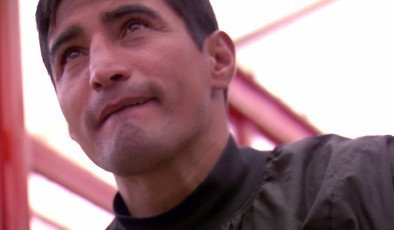A report from ESPN Deportes says that Mexican fighting legend and former four-weight champion Erik Morales has decided to call it quits on his fantastic career, dispensing with a planned farewell fight in his homeland. Morales, aged 37, walks away with an incredibly hard-fought 52-9(36) record – and “El Terrible’s” induction into The Hall of Fame is an absolute certainty when the appropriate five years have passed.
Turning pro in his native Tijuana in March of 19993 when he was just 16-years-old, Morales KO’d a guy named Jose Orejel inside a couple of rounds and reportedly spent his meagre payday on chewing gum. It wasn’t long at all before the tall and skinny, long-armed super-bantamweight was fighting for titles; first Hispano and Mexican belts and then NABF and world titles.
Becoming the WBC super-bantamweight ruler with an exciting 11th-round stoppage of countryman Daniel Zaragoza in September of 1997, Morales had arrived. He would go on to prove himself as one of the finest Mexican warriors of all-time. Good wins over the likes of Junior Jones and Wayne McCullough followed (Morales busting the ear drum of the teak-tough Irishman but being unable to stop him, later calling McCullough the toughest man he ever fought) before Morales fought the man who would become his fiercest and most intense rival: Marco Antonio Barrera.
The two greats, for whatever reason, never got on with one another, and the bad blood spilled over during their three epic encounters. The first fight, for the WBC and WBO 122-pound titles, thrilled the entire world. It was February 2000 in Las Vegas and the battle the two Mexican stars put on was simply breathtaking. To this day, whenever all-time great top-10 lists are compiled, the fight these two treated us all to is featured near the very top. The action was savage, intoxicating and unforgettable. Luckily for Morales, the scoring was flawed (in the opinion of most) and Erik got the win and kept his unbeaten record.
A rematch just had to happen and it did, just over two years later. By the time of the 2002 return, Barrera had knocked off wannabe superstar Naseem Hamed (a star attraction Morales also wanted to fight but never got the chance), while Morales had moved up to featherweight, won the WBC crown and seen off good names in Kevin Kelley, Gutsy Espadas Jr and In-Jin Chi (in another thriller). The eagerly awaited return meeting proved to be a more technical, cagey and less intense affair, to the disappointment of many, but how on earth could the first fight have been topped? This time Barrera got the 12-round decision, leaving Morales to simmer – for another two-and-a-half years.
Morales had lost his unbeaten record, but he soon regained the WBC featherweight title Barrera chose to vacate, with a solid win over Paulie Ayala. Wins over Espadas Jr (a return), Jesus Chavez and a gutsy Carlos Hernandez (Morales picking up the WBC and IBF super-featherweight belts) followed, before the rubber-match with “The Baby Faced Assassin.”
The trilogy was completed in 2004, the resulting fight being awarded with Ring Magazine’s Fight of The Year. As good as, or better than the first fight (depending on your own taste), the third fight, up at super-featherweight, was boxing at its best and the decision was so incredibly close, with Barrera picking up a majority verdict. The bad blood between these two had gone nowhere.
Morales, though, bounced back in terrific style. Making an incredibly risky move, Morales signed to fight the new sensation of the sport: the seemingly unstoppable Manny Pacquiao. Pacquiao had trounced Barrera in late 2003 and was seen by many as too young, too tough and too dangerous for Morales. Instead, in March of 2005, Morales rejuvenated his career with a brilliant points win over the southpaw dynamo. Another trilogy begun, Morales and Pac-Man would clash twice more in memorable battles. Though he was now past his best (as his upset points loss at lightweight, to the tricky Zahir Raheem in September of 2005 showed), Morales still had enough left, in the second fight with the Filipino, to be competitive. It wasn’t enough, though, and Morales was stopped for the first time in his career in early 2006, going down in the 10th-round of a brutal fight. A lesser man would have retired right there, but Morales fought Pacquiao a third time, this time being well beaten inside three disappointing rounds.
A shot at the WBC lightweight title saw Morales come up short against David Diaz in 2007 and afterwards, complaining of headaches, Morales retired – only to come back in 2010 and occasionally roll back the years with a good performance. Like when he fought the hard-hitting Marcos Maidana and, with one eye hammered shut, came within a whisker of scoring the upset. Or when Morales beat the much younger Pablo Cesar Cano to win the WBC light-welterweight title in September of 2011. This was Morales’ last good showing and subsequent losses to Danny Garcia – on points in the first meeting, by painful to watch 4th-round KO in the return – showed how far the once mighty fighting machine had fallen.
In terms of Morales’ legacy, however, these career-end fights do not mean all that much. Morales in his prime – which could be argued lasted from 1997 to the early 2000s – was an exceptional fighter: skilled, powerful and fearless. The wins Morales scored over fellow greats Barrera and Pacquiao are probably enough for his induction into The Hall of Fame, but “El Terrible” had many, many other great nights and victories.
Eastside Boxing wishes Erik all the best in his retirement.
